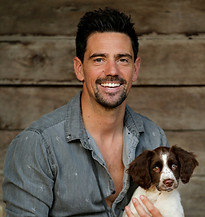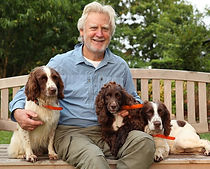
Activity Dogs
Dog Lovers Cruise 2026
Presentation Topics
Below is a guide to the topics the Presenters will be presenting.
These topics are subject to change, at the discretion of the presenters.



Kaye McGhie
(B.Bus) National Breeder Services Manager with Mars Petcare. International Conformation Judge. Breeder & Exhibitor
Lecturer: Companion Animal Nutrition. Certificates in Animal Behaviour & Welfare. Dog Cognition & Emotion
1/. Neonatal Issues - How Breeders can manage them and save puppies
2/. Epigenetics - The latest research and critical considerations for Breeders
3/. Nutrition for Breeding - Maximising success with science based strategies
4/. Dog Breeding Ethics - What Breeders NEED to know - how is the focus changing
5/. Functional Nutrition - Get that "Extra Edge" in Performance and in the Show Ring
6/. Dog Cognition - How do dogs really think and learn

Ryan Tate
Published author,Dog Training and Animal Behaviour, Canines for Conservation & Biosecurity, Zoo keeper
1/ Scent to Source: The evolution of biosecurity and pathogen detection dogs. From odour imprinting to complex
generalisation.
Real-world case studies from biosecurity deployments.
2/ Drive, Motivation and Play: Building the Engine Room of a Working Dog. Understanding prey drive, food motivation,
and how to build and shape them.
Structured play vs chaotic play - when and how to use each effectively.
Balancing arousal and control without killing the dog's spirit.
3/ Light, Camera, Focus: Behind the scenes of Film & TV Dog Training: Handling the chaos of set life: movement cues,
environmental stillness, continuity. Real stories from productions and how to prep dogs for precision
under pressure.
4/ Brain Games with Purpose: Using Cognitive Work to Reduce Anxiety and Boost Performance. Enrichment with
intent - how mental work regulates arousal and focus. Games that build problem-solving, impulse
control, and independence.
5/ Handler Psychology: Reading Yourself Before You Read the Dog. Emotional state, body language, and timing: how
you shape the outcome.Managing frustration, pressure, and building better training conversions.
6/ Lessons from Sharks and Seals: What Dangerous Animals Taught Us About Dog Training.
Real-world strategies from high-stakes wildlife work (emergency recall, stationing). Using novel
stimuli, trained back-up behaviours, and environmental control. Bridging high-consequence animal
training to practical canine applications.

Vicki Austin CPDT - KA
Dog Training and Behaviour, Industry Educator, Passionate About Understanding Dogs. Better Puppy Raising
1/. Association and Dissociation Timing - Ignore at your own Peril!
The optimum time to deliver reinforcement for dogs is thought to be during or within three seconds of the behaviour. The disassociation timeframe for dogs is thought to be ten seconds - a reinforcement delivered after ten seconds since the behaviour will not be associated to the behaviour. And the period between three and ten
seconds is a 'grey area.' It may or might be associated. Simple! Now let's expand on that.
2/. Anxiety - Prevention is More Successful than Treatment.
Dogs are prone to developing anxieties, ranging from mild to debilitating. Treatment strategies are not always successful, or may only relieve the level of suffering. However, prevention is relatively easy!
3/. What's Your Point Mr Pavlov?
Maybe you've learnt about Ivan Pavlov and his bell causing dogs to salivate. Maybe you also realise that this is how conditioned reinforcers (Clicker,Good, Yes) are created. But do you know how to use Pavlovian Conditioning to increase motivation? Or to treat fears and phobias? Condition snake avoidance? Here's a hint: it's not about reinforcing or punishing behaviour.
4/. Impulse Control and the Art of DRE (Differential Reinforcement of Excellence)
Yes, there is a science to dog training, but its application is an art-form. How much consideration do you give when delivering each and every reinforcement? Impulse control and DRE are the means of achieving high performance.
The principles apply to professional working dogs, competition dogs and pet dogs.

Steve Austin CPDT - KA
International Dog Trainer, Recognised Leader in Scent Detection, Passionate About Dogs for Conservation, Professional Mentor
1/ Learning Readiness :
Knowing when not to train your dog is possibly the most important skill in the dog trainer's toolbox. We've all made the mistake of pushing our dogs in training sessions when we know they've had enough; no longer enjoying themselves. Or, they're not in the 'right frame of mind' from the outset. But, we've put this time aside to train! We're here at the training ground! And what if you're not in the right mindset? Is it possible to turn it around and train after all?
2/. Identifying Training Obstacles:
Instead of avoiding the problem or throwing in the towel; identify it, deal with it, and move forward. Identifying obstacles is the first step in moving past them. Develop the mindset that will allow you to tackle training problems head-on.
3/. The Benefits of Understanding Other Forms of Training:
When I started training my first Border Collie for obedience competition it was a steep learning curve for me at 25 years of age. When he gained is CDX (Companion Dog Excellent) title, I thought I was a genius! I knew it all! Then I was asked to be the NSWCC representative at a Utility Gundog Field Trial. It was a whole new experience; those dogs and their handlers showed me a whole of dog training that I knew nothing about. Since then, I have enjoyed that type of learning experience many times. It has truly expanded my training knowledge and skills
4/. Is your Scent Dog Ready for the Real World
You've done the training and your dog is shaping up nicely. But is it ready for the working environment: the bush, the paddock, the airport, the competition, the factory....... What boxes might still need ticking?

Dr Xavier Schneider BIT BLM(dist) BVSc(hons) MANZCVS (Animal Reproduction) Dip ACT
Registered Specialist in Theriogenology (Reproduction) Canine, Equine and Bovine reproduction, medicine and surgery.
1. Updates on Ovulation Timing and Insemination in the bitch
2. Surgical AI vs TCI - demystifying the great debate
3. Pregnancy, parturition and the elective caesarean
4. Neonatal Resuscitation and the new RECOVER guidelines
5. Reproductive Diseases in the bitch and stud dog
6. Updates on the Effects of Desexing

Dr Hannah Schneider BVSc (Hons) DipACVIM,
Internal Medicine Specialist, Board Certified in Internal Medicine
1/. Diarrhoea in Dogs
Common causes, treatments and prognosis of diarrhoea in puppies to adult dogs.
2/. Urinary Incontinence
From puppies to older females, diagnosis, treatments and prognosis as well as incontinence in male dogs.

Amy Smith
Certificate IV Dog Training & Behaviour NDTF
Software Developer of - Sound Proof Puppy Training App
1/. Business Structure,
From the App, to Running a Successful Puppy Classes and Success with Online Courses.
2/. Tales from Puppy School - What we really are dealing with
Social Media, how to be successful on socials, make money and deal with unhinged comments on criticism.
How algorithm works

Libby Young (Angyal)
Founder of The Sound Hound - Dog Behaviour & Training
1/ Impoverished Early Socialisation Periods in Puppies:
Examining impacts and behavioural outcomes for dogs acquired later than 8 weeks of age.
A detailed look at issues, risks and prognosis for dogs adopted at specific micro-periods within the critical phase (10,12,14,16 weeks ) and beyond. And strategies to mitigate associated risks.
2/ Seperation Distress
Prevention, treatment and compounding factors in early independence training

Karen Sadler
Agrade Animals Dog Training New Zealand
1/. Building Trust and Respect with Calm Energy and Clear Gaze
The importance of Clear Signals, Body Language and Calm Demeanour in everyday Life and Training.
.jpg)
Di Gooding
Dip Animal Technology, Certificate IV in Training and Assessment
1/ "First Response - Would you know what to do in an emergency"?
Initial actions can make all the difference in an emergency. We will explore what you can do to minimise adverse outcomes for your dog, with an emphasis on dangers faced in Australia.
